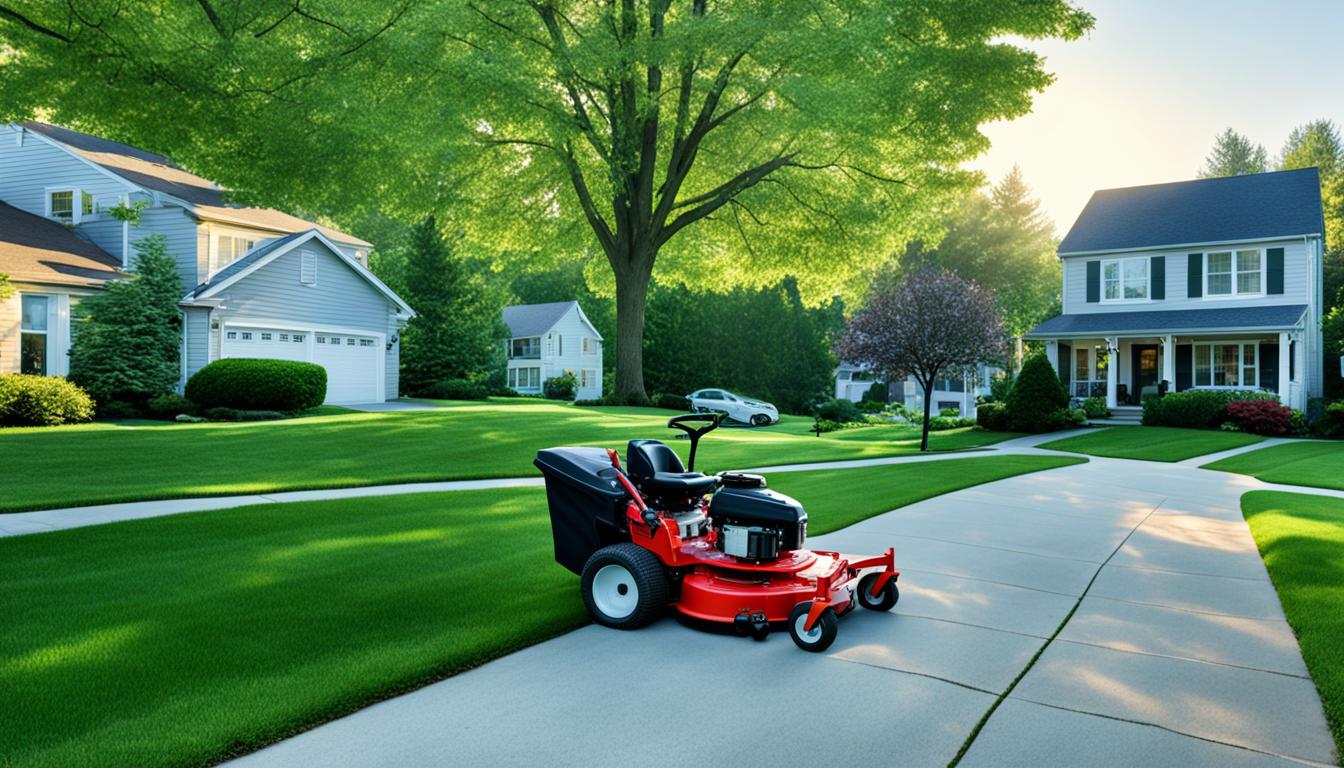Have you ever wondered what time you can mow your lawn without disturbing your neighbors or violating any regulations? Well, you’re not alone. Many homeowners across the United States grapple with this question, hoping to find the best times for lawn care while also complying with local noise ordinances. But is there a universal rule on when you can mow your lawn, or does it vary from place to place?
Key Takeaways:
- The regulations for lawn mowing times differ across cities, counties, and states in the U.S.
- Local noise ordinances aim to minimize noise disturbances and protect residents’ well-being.
- Being a considerate neighbor and following these regulations can help maintain positive relationships in your community.
- Factors like wet or dewy grass, heat stress, and lawn health should be considered when deciding on the best mowing time.
- Understanding and adhering to local noise ordinances is crucial to avoid fines or penalties and create a harmonious living environment.
The Importance of Being Considerate Neighbor
Living in close proximity to neighbors requires being considerate and mindful of the noise you make, especially during yard work. Engaging in lawn care activities, such as mowing the lawn, can be noisy and disruptive if not done at appropriate times.
In order to maintain positive relationships with your neighbors and create a peaceful environment in your community, it is essential to be a considerate neighbor and follow local noise ordinances. By doing so, you can ensure that your lawn care activities do not disturb others and help foster a harmonious living environment.
“Being considerate of others will take your children further in life than any college degree.” – Marian Wright Edelman
When it comes to lawn care, noise disturbances can be minimized by adhering to specific guidelines and being aware of the best times for performing these activities. By prioritizing the comfort and well-being of your neighbors, you can maintain a positive rapport and contribute to a peaceful neighborhood.
Next, we will explore the various factors to consider when determining the optimal time for lawn mowing and how to effectively reduce noise and disturbance while carrying out this essential task.
| Noise Ordinance | Purpose | Noise Limits |
|---|---|---|
| City of Greenfield Noise Ordinance | To ensure peace and tranquility in residential areas | Daytime: 60 dB(A) Evening: 55 dB(A) Nighttime: 50 dB(A) |
| County Noise Ordinance | To prevent noise pollution and protect residents’ quality of life | Day and Night: 45 dB(A) |
| Statewide Noise Regulations | To establish uniform guidelines for noise control across the state | Varies by time of day and residential zoning |
- City of Greenfield Noise Ordinance: The noise ordinance in the City of Greenfield aims to ensure peace and tranquility in residential areas. During the daytime, noise levels should not exceed 60 dB(A), while in the evening and nighttime, the limits are 55 dB(A) and 50 dB(A) respectively.
- County Noise Ordinance: The county’s noise ordinance sets an acceptable noise limit of 45 dB(A) during both day and night.
- Statewide Noise Regulations: Statewide noise regulations provide guidelines and limits for noise control across the state. These regulations may vary based on the time of day and residential zoning.
By understanding these local noise ordinances, you can ensure that your lawn care activities align with the established guidelines, minimize noise disturbances, and maintain a respectful relationship with your neighbors.
Factors to Consider for Lawn Mowing Time
When it comes to mowing your lawn, selecting the right time can significantly impact the health and appearance of your yard. To make an informed decision, several factors should be considered, including scientific reasons, pros and cons, and overall lawn health.
Wet Grass in the Early Morning
Early morning dew or wet grass can make mowing more challenging and potentially harm your lawn. The moisture can clump the grass together, leading to an uneven cut and potentially damaging the blades. It’s best to avoid mowing during this time to maintain the lawn’s health and appearance.
Mid-Morning: The Optimal Time
Mid-morning, generally after the dew has evaporated, is often considered the ideal time to mow your lawn. The grass will have dried, making it easier to trim evenly. Additionally, the grass typically stands tall during this time, resulting in a more professional-looking cut.
Heat Stress in the Middle of the Day
Mowing during the hottest part of the day can expose the lawn to heat stress. The combination of intense sunlight and high temperatures can cause the grass to become stressed or even brown. It’s best to avoid mowing during this time to prevent potential damage to your lawn.
Late Afternoon and Early Evening
For those unable to mow in the mid-morning, late afternoon and early evening can be suitable alternatives. During this time, temperatures tend to be lower, reducing the risk of heat stress. However, ensure that you finish mowing with enough daylight remaining and avoid mowing too close to sunset.
Each time frame has its own set of advantages and disadvantages in terms of lawn health and noise disturbance. By considering these factors, you can determine the best time to mow your lawn, ensuring its optimal health and appearance.
| Pros | Cons |
|---|---|
|
|
Local Regulations on Lawn Mowing Times
Lawn mowing times are regulated through local noise ordinances and guidelines set by cities, counties, and states. While there is no countrywide law, each jurisdiction may have specific rules and restrictions on when you can legally mow your lawn.
Most commonly, there are guidelines prohibiting the use of loud equipment like lawnmowers between certain hours, typically from 10.00 pm to 7.00 am. These regulations can vary by city, county, and state, and it is crucial to check the local noise ordinances in your specific area to comply with the law and be considerate of your neighbors.
Being aware of the local regulations regarding lawn mowing times is important to avoid any potential fines or penalties and maintain a harmonious community. Let’s explore some additional details:
Familiarize Yourself with City Guidelines
“Every city has its own set of regulations when it comes to lawn mowing times. It’s important to familiarize yourself with the guidelines specific to your city to ensure you’re following the rules and being a considerate neighbor.”
Understand State Guidelines
“In addition to city guidelines, some states have their own regulations on lawn mowing times. Understanding the state guidelines is essential, especially if you live in a state with stricter regulations or specific limitations.”
Check Noise Ordinances
“Local noise ordinances play a significant role in determining lawn mowing times. These ordinances are put in place to minimize noise disturbances and protect the well-being of residents. Checking the noise ordinances in your area can help you determine the specific hours during which you can operate your lawnmower.”
Contact Local Authorities
“If you’re unsure about the local regulations or noise ordinances in your area, don’t hesitate to reach out to the local authorities. They can provide you with the necessary information and clarify any questions or concerns you may have.”
By being knowledgeable about the local regulations on lawn mowing times, you can avoid potential conflicts with your neighbors and ensure you’re maintaining a peaceful environment in your community.
Understanding Local Noise Ordinances
Local noise ordinances play a crucial role in regulating and controlling noise pollution, including the noise generated by lawn maintenance activities. Enacted by cities, counties, and states, these ordinances aim to set limits on acceptable noise levels during specific times, particularly in residential areas. By minimizing noise disturbances, local noise ordinances protect the well-being and quality of life of residents.
The purpose of these ordinances is clear: to create a harmonious community where individuals can enjoy peaceful environments. Factors such as the time of day, day of the week, residential zoning, and the type of equipment used are considered when formulating these regulations. By understanding and adhering to these ordinances, homeowners can contribute to maintaining a peaceful and noise-conscious neighborhood.
Let’s take a closer look at the role local noise ordinances play in maintaining a harmonious community:
- Minimizing Noise Pollution: Local noise ordinances aim to reduce noise pollution, which can have detrimental effects on physical and mental health. By setting limits on noise levels, these ordinances ensure that residents can enjoy a quiet and peaceful living environment.
- Defining Limits: Local noise ordinances provide specific guidelines on noise levels deemed acceptable during different times of the day. “Quiet hours” are often established during the evening and early morning to minimize disturbances during sleep and relaxation times.
- Residential Zoning: The zoning of a particular area, such as residential, commercial, or industrial, may also influence the noise regulations in place. Residential areas, where individuals expect a quieter ambiance, often have stricter noise limits compared to commercial or industrial zones.
“Local noise ordinances are essential for maintaining a peaceful and livable community. By adhering to these regulations, residents can enjoy a quieter environment and minimize noise disturbances.”
Understanding and respecting local noise ordinances is vital for homeowners who engage in lawn maintenance activities. By doing so, they can ensure they are in compliance with the law while fostering a considerate and peaceful neighborhood for all residents.
How to Find Your Local Noise Ordinance
When it comes to finding your local noise ordinances, the process is simpler than you might think. There are several avenues you can explore to access this information:
- Visit your city or county’s official website: Start by visiting the official website of your city or county. Look for sections related to codes, ordinances, or regulations. These sections often provide detailed information about noise ordinances and any specific regulations regarding lawn mowing times.
- Conduct an online search: If you can’t find the information on your city or county’s official website, try conducting an online search using your location’s name along with keywords like “noise ordinance” or “lawn mowing regulations.” This can help you find relevant websites or resources that contain the information you need.
- Contact your local government office: If you’re unable to locate the noise ordinances online, reach out to your local government office for assistance. City hall or the county administration building are good places to start. Their staff can provide you with the necessary information or direct you to the appropriate department responsible for noise ordinances.
- Check homeowner association (HOA) rules: If you live in a neighborhood or community governed by a homeowner association, it’s worth checking your HOA rules and regulations. They may have specific guidelines in place regarding lawn mowing times and noise restrictions.
- Explore public library resources: Public libraries often have resources available related to local laws and regulations. Visit your local library or check their website for any relevant materials or references that can help you understand the noise ordinances in your area.
By utilizing these methods, you can easily find and familiarize yourself with your local noise ordinances. It’s essential to comply with these regulations to be a considerate neighbor and avoid any potential fines or penalties.
Tips for Reducing Lawn Mowing Noise and Disturbance
While adhering to local noise ordinances is essential, there are additional steps you can take to minimize lawn mowing noise and disturbance. By following these tips, you can ensure a quieter and more considerate lawn care routine.
- Choose a Quieter Lawnmower: Opt for a lawnmower that produces less noise, such as an electric model. Electric lawnmowers are known for their quieter operation compared to gas-powered ones, helping to reduce noise pollution in your neighborhood.
- Maintain Your Lawnmower Regularly: Proper maintenance of your lawnmower can help minimize noise and vibration. Regularly check and clean the cutting blades and ensure that the engine is in good working condition. Follow the manufacturer’s instructions for maintenance and lubrication to keep your lawnmower running smoothly and quietly.
- Mow at Reasonable Hours: Choose to mow your lawn during reasonable hours to minimize disturbance to your neighbors. Mid-morning or late afternoon is often considered suitable as people are less likely to be disturbed during these times. Avoid mowing early in the morning or late in the evening when neighbors may be enjoying their peace and quiet.
- Notify Your Neighbors: If you plan to mow your lawn at a time that may be disruptive, it is considerate to inform your neighbors in advance. This simple act of communication can help them plan accordingly and mitigate any inconvenience caused by the noise.
- Practice Proper Mowing Technique: Using proper mowing techniques can help reduce the time spent using the lawnmower and minimize noise. Adjust the height settings to the appropriate level for your grass type, ensuring you are not cutting too short or leaving it too long. Mow in a consistent pattern to efficiently cover the entire lawn.
By following these tips, you can reduce lawn mowing noise and minimize disturbance in your neighborhood. Being a considerate neighbor and taking proactive steps to minimize noise pollution will contribute to a more harmonious and peaceful community.
| Tip | Description |
|---|---|
| Choose a Quieter Lawnmower | Opt for an electric lawnmower, known for their quieter operation compared to gas-powered ones. |
| Maintain Your Lawnmower Regularly | Regularly clean and check the cutting blades and ensure proper engine maintenance for minimal noise and vibration. |
| Mow at Reasonable Hours | Choose mid-morning or late afternoon to minimize disturbance to neighbors. |
| Notify Your Neighbors | Inform your neighbors in advance if you need to mow at a time that may be disruptive. |
| Practice Proper Mowing Technique | Adjust height settings, mow in a consistent pattern, and follow proper mowing techniques to reduce noise and mowing time. |
Benefits of Adhering to Noise Ordinances
Adhering to local noise ordinances while maintaining your lawn has several benefits. By following these regulations, you can:
- Improve Community Relationships: Being considerate of your neighbors and minimizing noise disturbances helps build and strengthen community relationships. It fosters a sense of harmony, trust, and mutual respect among residents.
- Reduce Noise Pollution: Noise pollution can have detrimental effects on people’s health and well-being. Adhering to noise ordinances contributes to a quieter and more peaceful neighborhood, allowing everyone to enjoy a calmer and more serene living environment.
- Avoid Fines or Penalties: Compliance with local noise ordinances helps you avoid potential fines, penalties, or legal action. By being aware of and following the regulations, you protect yourself from any potential financial repercussions.
- Set an Example: When you adhere to noise ordinances, you set a positive example for your neighbors and the community. Your responsible behavior can inspire others to follow suit, creating a domino effect of considerate actions and contributing to a harmonious and enjoyable living environment.
State or City Specific Lawn Mowing Regulations
While noise ordinances are primarily regulated on a local level, some states and large cities may have statewide guidelines or specific regulations regarding lawn mowing times. It’s important for homeowners to understand the specific regulations and guidelines in their state, city, or county to ensure compliance.
In California, there are statewide noise regulations that require local governments to adopt noise ordinances aligned with state guidelines. This means that specific regulations regarding lawn mowing times may vary between cities and counties in California.
For example, in New York City, there are specific guidelines for lawn mowing times. The city restricts the use of certain equipment during specific hours to limit noise disturbances in residential areas.
Delaware, on the other hand, prohibits the use of loud equipment during specific hours statewide. This ensures that noise pollution is minimized and residents can enjoy a peaceful environment.
Researching and understanding the state or city specific lawn mowing regulations is crucial for homeowners to comply with the law and be considerate of their neighbors. By being aware of the regulations, homeowners can avoid fines or penalties and contribute to a harmonious living environment.
Example of State or City Specific Lawn Mowing Regulations
| State/City | Lawn Mowing Regulations |
|---|---|
| California | Varies between cities and counties; statewide noise regulations require local governments to adopt noise ordinances aligned with state guidelines |
| New York City | Specific guidelines for lawn mowing times; restriction on the use of certain equipment during specific hours in residential areas |
| Delaware | Prohibits the use of loud equipment during specific hours statewide |
Conclusion
In conclusion, understanding the regulations and guidelines for lawn mowing times is crucial for homeowners in the United States. Laws and restrictions vary by city, county, and state, and are enforced through local noise ordinances. By being a considerate neighbor and adhering to these regulations, you can maintain positive relationships, minimize noise disturbances, and create a peaceful environment in your community.
Following local noise ordinances not only helps you avoid fines and penalties but also contributes to a more harmonious and enjoyable living environment for everyone. By mowing your lawn at appropriate times, you can ensure compliance with the law and show respect for your neighbors’ peace and quiet. Being a considerate neighbor goes beyond being aware of the regulations; it involves actively taking steps to minimize noise and disturbance during lawn care activities.
By following the recommended lawn mowing times, using quieter lawnmower options, and notifying your neighbors when necessary, you can reduce noise pollution and set an example for others. Adhering to local noise ordinances not only benefits you but also benefits the entire community by fostering better relationships and a more pleasant living environment. Remember, being a considerate neighbor and complying with local regulations are the keys to maintaining a peaceful and harmonious neighborhood while enjoying the benefits of a well-maintained lawn.





